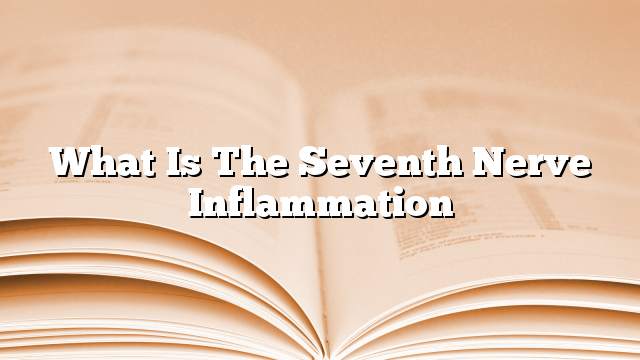seventh nerve
The seventh nerve, also known as the facial nerve, is one of the twelfth cranial nerves (twelve pairs of nerves that originate from the brain, unlike the spinal nerves that originate from the spinal cord, known by their names and numbers). This nerve supplies the muscles responsible for facial expressions, such as those responsible for lifting eyebrows, closing eyes, smiling or controlling lips and others, as well as some other facial muscles. It also gives taste to the front part of the tongue, and also functions to nourish many existing glands In the head and neck, such as salivary, mucous and tear glands.
The path of the seventh nerve is somewhat complex and has many branches. This path is divided into two parts, the first being inside the skull and the second when it comes out to the face and neck. It passes through the valopian channel in the skull, and then behind the ear, opening it up to the facial muscles On both sides, and therefore any disorder or imbalance in those areas experienced by the seventh nerve may lead to damage or paralyze.
Seventh nerve inflammation
It is also called Bell’s palsy, relative to the Scottish surgeon Charles Bell, a temporary form of the seventh nerve palsy, gets the seventh when exposed to nerve inflammation, pressure or swelling. Often this case affects only one individual from the seventh nerve, so the impact on one side of the face, but in some rare cases, it may be the effect on both sides. It affects the men and women of the disease both, and it may come at any age, but it is less common at least age of 15 years and more than 60 years, and increasing rates of infection in pregnant women or people with diabetes or people suffering from pneumonia As well as people with a family history of Bell’s palsy.
It should be noted that Bell’s paralysis does not result from a stroke or a lack of cerebral ischemia, but these cases may cause the seventh nerve paralysis, but they cause suffering in the lower jaw, in contrast to Bell’s paralysis, which affects one whole side of the face, To many of the differences between them, so you should see your doctor immediately about the feeling of sudden weakness in the side of the face to make sure they are not infected.
There is no known reason behind the seventh nerve inflammation, but the belief in the medical community that it results from infection with viral infection, such as viral meningitis or herpes simplex virus, when the seventh nerve injury these viruses occur changes associated with this inflammation, such as irritation and swelling, Thus putting pressure inside the fallopian duct through which the oxygen supply is cut off from the neurons, causing temporary paralysis accompanied by many symptoms.
The seventh nerve inflammation may be associated with many diseases, such as influenza, high blood pressure, diabetes and tumors, as well as injury to the seventh nerve, or a skull fracture, and in other cases it may occur as immunity or tension. Bell’s paralysis is the most common reason for paralysis of the seventh nerve. It may also result from many causes, such as stroke, paralysis of the seventh nerve or injury to the seventh nerve either as a result of a blow or injury when performing a process in the neck or parotid gland. Below the ear.
Symptoms Associated With Neuritis VII
The severity of symptoms associated with inflammation of the seventh nerve between facial numbness and full paralysis. Symptoms start to appear abruptly, and then worsen within three days, often gradually disappearing within weeks or months. The symptoms associated with inflammation of the seventh nerve are as follows:
- Suffering from weakness or paralysis in one side of the face, so the patient finds it difficult to close the eye in the affected side, in addition to mouth drooping in this area.
- Eye irritation in the affected area, in addition to dryness, and may suffer from the patient also the frequency of tears in the eye itself in some cases due to remain open.
- Feeling pain in the ear on the affected side, the patient may also suffer from tinnitus, as well as sensitivity to high voices sometimes.
- The saliva swallows involuntarily on the affected side, and the patient suffers from difficulty when eating or drinking, and may be affected by the sense of taste.
- The suffering of speechlessness.
Treatment of seventh nerve inflammation
Most cases of seventh nerve inflammation heal within months without any medical procedure, but there are some drugs that can relieve symptoms and may help speed up the healing process. The most prominent drugs used to relieve the inflammation of the seventh nerve are those containing corticosteroid compounds. The patient can also use different painkillers to relieve the pain associated with inflammation of the seventh nerve, such as acetaminophen, and ibuprofen. Some doctors may use antiretroviral drugs if the infection is caused by a viral infection. It is also sometimes recommended to perform physiotherapy for facial muscles. It is also necessary to maintain the health of the eye, as a cover and the use of some types of drops to prevent the drought.
